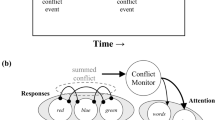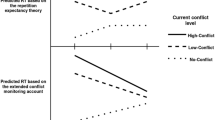Abstract
An increasing number of studies in the conflict/control and perceptual desirable difficulty literatures show memory benefits for information in high-conflict task situations. Recent work suggests that increased conflict does not produce a task-wide encoding benefit; rather, conflict must focus high-level attention on to-be-tested information to produce an encoding benefit. We used pupil dilation measures to directly assess this stage-specific model of conflict-encoding effects. We show clear performance costs of incongruency (slower RT and larger pupil dilation) with both semantic and response distractors, but show memory benefits only with semantic conflict. Further, when participants were encouraged to focus more (eliciting greater endogenous effort and control for all trials, not just incongruent trials), we observe larger and more similar pupil responses and reduced memory differences between high versus low semantic conflict conditions. These data confirm and extend a stage-specific model of conflict-encoding effects, with converging behavioural and physiological data.




Similar content being viewed by others
Data availability
The datasets during and/or analysed during the current study are available from the corresponding author on reasonable request.
References
Bates, D., Mächler, M., Bolker, B., & Walker, S. (2015). Fitting linear mixed-effects models using lme4. Journal of Statistical Software, 67, 1–48. https://doi.org/10.18637/jss.v067.i01.
Beatty, J., & Lucero-Wagoner, B. (2000). The pupillary system. In J. T. Cacioppo, L. G. Tassinary, & G. G. Berntson (Eds.), Handbook of psychophysiology (pp. 142–162). New York, NY, USA: Cambridge University Press.
Botvinick, M. M. (2007). Conflict monitoring and decision making: reconciling two perspectives on anterior cingulate function. Cognitive, Affective, and Behavioral Neuroscience, 7(4), 356–366.
Botvinick, M. M., Braver, T. S., Barch, D. M., Carter, C. S., & Cohen, J. D. (2001). Conflict monitoring and cognitive control. Psychological Review, 108(3), 624–652. https://doi.org/10.1037//0033-295X.I08.3.624.
Braem, S., Abrahamse, E. L., Duthoo, W., & Notebaert, W. (2014). What determines the specificity of conflict adaptation? A review, critical analysis, and proposed synthesis. Frontiers in Psychology, 5, 1134. https://doi.org/10.3389/fpsyg.2014.01134.
Chisholm, J. D., Risko, E. F., & Kingstone, A. (2013). The embodiment of focus: Investigating the impact of leaning behavior on our cognitive state and other's perception of our cognitive state. Journal of Experimental Psychology: Human Perception and Performance, 39, 100–110.
Chiu, Y. C., & Egner, T. (2015). Inhibition-induced forgetting when more control leads to less memory. Psychological Science, 26(1), 27–38. https://doi.org/10.1177/0956797614553945.
R Core Team (2019). R: A language and environment for statistical computing. R Foundation for Statistical Computing, Vienna, Austria. Retrieved from https://www.R-project.org/
Diemand-Yauman, C., Oppenheimer, D. M., & Vaughan, E. B. (2011). Fortune favors the bold (and the Italicized): Effects of disfluency on educational outcomes. Cognition, 118(1), 111–115. https://doi.org/10.1016/j.cognition.2010.09.012.
Egner, T. (2008). Multiple conflict-driven control mechanisms in the human brain. Trends in Cognitive Sciences, 12, 374–380. https://doi.org/10.1016/j.tics.2008.07.001.
Egner, T. (2014). Creatures of habit (and control): a multi-level learning perspective on the modulation of congruency effects. Frontiers in Psychology, 5, 1247. https://doi.org/10.3389/fpsyg.2014.01247.
Egner, T., Delano, M., & Hirsch, J. (2007). Separate conflict-specific cognitive control mechanisms in the human brain. Neuroimage, 35, 940–948. https://doi.org/10.1016/j.neuroimage.2006.11.061.
Eriksen, B. A., & Eriksen, C. W. (1974). Effects of noise letters upon the identification of a target letter in a nonsearch task. Perception & Psychophysics, 16(1), 143–149.
Faul, F., Erdfelder, E., Lang, A.-G., & Buchner, A. (2007). G*Power 3: A flexible statistical power analysis program for the social, behavioral, and biomedical sciences. Behavior Research Methods, 39, 175–191.
Gratton, G., Coles, M. G., & Donchin, E. (1992). Optimizing the use of information: Strategic control of activation of responses. Journal of Experimental Psychology: General, 121, 480–506.
Hommel, B. (2004). Event files: feature binding in and across perception and action. Trends in Cognitive Sciences, 8, 494–500. https://doi.org/10.1016/j.tics.2004.08.007.
Krebs, R. M., Boehler, C. N., De Belder, M., & Egner, T. (2015). Neural conflict-control mechanisms improve memory for target stimuli. Cerebral Cortex (New York, NY), 25(3), 833–843. https://doi.org/10.1093/cercor/bht283.
Kucewicz, M. T., Dolezal, J., Kremen, V., Berry, B. M., Miller, L. R., Magee, A. L., et al. (2018). Pupil size reflects successful encoding and recall of memory in humans. Scientific Reports, 8, 4949. https://doi.org/10.1038/s41598-018-23197-6.
Kühl, T., & Eitel, A. (2016). Effects of disfluency on cognitive and metacognitive processes and outcomes. Metacognition and Learning, 11, 1–13. https://doi.org/10.1007/s11409-016-9154-x.
Laeng, B., Ørbo, M., Holmlund, T., & Miozzo, M. (2011). Pupillary Stroop effects. Cognitive Processing, 12, 13–21. https://doi.org/10.1007/s10339-010-0370-z.
Luke, S. G. (2017). Evaluating significance in linear mixed-effects models in R. Behavior Research Methods, 49, 1494–1502.
Ortiz-Tudela, J., Milliken, B., Botta, F., LaPointe, M., & Lupianez, J. (2017). A cow on the prairie vs. a cow on the street: Long-term consequences of semantic conflict on episodic encoding. Psychological Research Psychologische Forschung, 81, 1264–1275. https://doi.org/10.1007/s00426-016-0805-y.
Ortiz-Tudela, J., Milliken, B., Jimenez, L., & Lupianez, J. (2018). Attentional influences on memory formation: A tale of a not-so-simple story. Memory and Cognition, 46, 544–557. https://doi.org/10.3758/s13421-017-0784-2.
Ptok, M. J., Thomson, S. J., Humphreys, K. R., & Watter, S. (2019). Congruencyencoding effects on recognition memory: A stage-specific account of desirable difficulty. Frontiers in Psychology, 10, 858. https://doi.org/10.3389/fpsyg.2019.00858.
Rosner, T. M., D’Angelo, M. C., MacLellan, E., & Milliken, B. (2015a). Selective attention and recognition: effects of congruency on episodic learning. Psychological Research Psychologische Forschung, 79, 411–424. https://doi.org/10.1007/s00426-014-0572-6.
Rosner, T. M., Davis, H., & Milliken, B. (2015b). Perceptual blurring and recognition memory: a desirable difficulty effect revealed. Acta Psychologica, 160, 11–22. https://doi.org/10.1016/j.actpsy.2015.06.006.
Simon, J. R., & Small, A. M., Jr. (1969). Processing auditory information: Interference from an irrelevant cue. Journal of Applied Psychology, 53, 433–435.
Singmann, H., Bolker, B., Westfall, J., Aust, F., & Ben-Shachar, M. S. (2019). afex: Analysis of Factorial Experiments. R package version 0.25-1. Retrieved from https://CRAN.R-project.org/package=afex
Sirois, S., & Brisson, J. (2014). Pupillometry. Wiley Interdisciplinary Reviews Cognitive Science, 5, 679–692.
Stroop, J. R. (1935). Studies of interference in serial verbal reactions. Journal of Experimental Psychology, 18(6), 643.
Van Steenbergen, H., & Band, G. P. H. (2013). Pupil dilation in the Simon task as a marker of conflict processing. Frontiers in Human Neuroscience, 7, 215. https://doi.org/10.3389/fnhum.2013.00215.
Verguts, T., & Notebaert, W. (2008). Hebbian learning of cognitive control: dealing with specific and nonspecific adaptation. Psychological Review, 115(2), 518.
Verguts, T., & Notebaert, W. (2009). Adaptation by binding: a learning account 2163 of cognitive control. Trends in Cognitive Science, 13, 252–257. https://doi.org/10.1016/j.2164tics.2009.02.007.
Wendt, M., Kiesel, A., Geringswald, F., Purmann, S., & Fischer, R. (2014). Attentional adjustment to conflict strength: Evidence from the effects of manipulating flanker-target SOA on response times and prestimulus pupil size. Experimental Psychology, 61, 55–67. https://doi.org/10.1027/1618-3169/a000227.
Funding
This study was funded by Natural Sciences and Engineering Research Council of Canada (327454).
Author information
Authors and Affiliations
Contributions
MP and SW both played a significant role in all aspects of this project including the experimental design, entry, analysis, interpretation of data, the drafting and revising of this manuscript, and final approval for publication. KH was involved in data collection, interpretation of data, drafting and revising of this manuscript.
Corresponding authors
Ethics declarations
Conflict of interest
The authors declare that they have no conflict of interest.
Ethical approval
All procedures performed in studies involving human participants were in accordance with the ethical standards of the institutional and/or national research committee of McMaster University and with the 1964 Helsinki Declaration and its later amendments or comparable ethical standards.
Informed consent
Informed consent was obtained from all individual participants included in the study.
Additional information
Publisher's Note
Springer Nature remains neutral with regard to jurisdictional claims in published maps and institutional affiliations.
Rights and permissions
About this article
Cite this article
Ptok, M.J., Hannah, K.E. & Watter, S. Memory effects of conflict and cognitive control are processing stage-specific: evidence from pupillometry. Psychological Research 85, 1029–1046 (2021). https://doi.org/10.1007/s00426-020-01295-3
Received:
Accepted:
Published:
Issue Date:
DOI: https://doi.org/10.1007/s00426-020-01295-3




